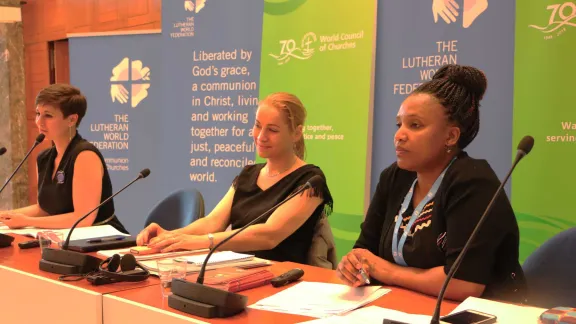
Jillian Aballe (World Council of Churches), Christine Löw (UN Women Geneva liaison office) and Christine Mangale (Lutheran Office for World Community) sit on a panel during the women's human rights advocacy training for faith-based organizations, held in Geneva. Photo: LWF/George Arende
Faith organizations learn UN mechanisms to promote women
(LWI) - Feminist faith actors will be critical to ensuring the Sustainable Development Goals (SDGs) are implemented, the director of the UN Women liaison office in Geneva has told a women’s human rights training run by five faith organizations, including the Lutheran World Federation.
Christine Löw, of UN Women, said faith organizations can contribute to gender equality and the SDGs because they are “uniquely positioned” to take on the challenge of addressing patriarchal structures and gender discrimination. Eighty percent of the world’s population identifies as religious.
Feminist faith actors can illustrate how religion can be a tool of liberation.
“It is therefore key to identify and amplify feminist faith actors. Their presence can illustrate how religion can be a tool of liberation.
“Identifying the religious barriers to women’s rights and bridging civil society and development aims is crucial in the realization of Agenda 2030 [the SDGs] and beyond. Bringing in faith-based organizations will assist with the realization of the SDGS, for which gender equality is an end goal and foundational principle.”
However, several steps needed to occur. The work of feminist faith leaders and organizations needed to be strengthened, women needed to be elevated in the interpretation of religious doctrine, and collaboration between faith-based and secular feminist groups needed to be improved, Löw.said
Religion plays a central role
The “Women’s human rights advocacy training” is taking place in the Ecumenical Centre, in Geneva. It is organized by the LWF, the World Council of Churches, Church of Sweden, FinnChurchAid and Mission 21. Nearly 50 women and men are learning how UN advocacy works and how to use UN bodies to improve the rights of women.
On July 6, the group will take part in the UN’s Committee on the Elimination of Discrimination against Women (CEDAW), which runs throughout most of July, and practice writing shadow reports.
“By improving the ability of faith organizations to bring local advocacy to the global arena, particularly through CEDAW and the UN periodic review of human rights in member states, we can help faith-based actors engage in civil society initiatives denouncing harmful and discriminatory practices,” LWF Secretary for Women in Church and Society, Rev. Dr Elaine Neuenfeldt said. “We can build bridges between churches and local faith-based communities to global mechanisms on advocacy.”
Amélie Barras, professor at York University, Canada, presented her research on how and why faith-based organizations (FBOs) are engaging with the UN and its human rights mechanisms.
“On one side, we see the importance of making UN work palatable to groups and congregations on the ground so they understand the importance of working at the international level and on the other, highlighting how FBOs can make important contributions to UN mechanisms because of their extensive networks in the field and their ability therefore to represent 'unrepresented' voices at the UN.”


